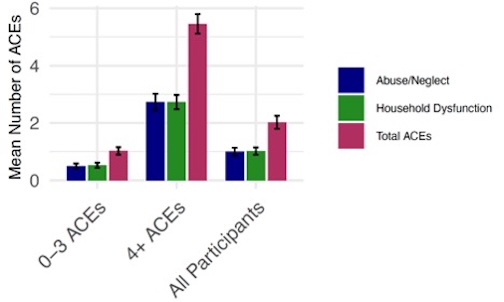Session Information
Date: Monday, October 27, 2025
Title: (1553–1591) Systemic Sclerosis & Related Disorders – Clinical Poster II
Session Type: Poster Session B
Session Time: 10:30AM-12:30PM
Background/Purpose: There is growing evidence that trauma, and in particular adverse childhood experiences (ACEs), play a role in the pathogenesis and exacerbation of systemic autoimmune disease.1 ACEs likely affect autoimmunity through multiple pathways, including pro-inflammatory processes and associations with psychosocial influences on the development of autoimmunity, such as substance use and mental health disorders. To date, no studies have evaluated the association between ACEs and disease manifestations in systemic sclerosis (SSc). The purpose of this study is to evaluate the prevalence of ACEs in SSc patients and to describe the clinical characteristics of patients with SSc with high adversity.
Methods: We recruited consecutive patients who met 2013 ACR/EULAR criteria for SSc seen in our UCLA Scleroderma Center from September 4, 2024 to April 9, 2025. The Adverse Childhood Experiences Questionnaire (ACE-Q), was administered to assess the frequency of ACEs experienced by respondents.2 The ACE-Q categorizes ACEs into 2 subdomains: abuse/neglect and household dysfunction. Descriptive statistics were used to demonstrate the demographic and clinical characteristics of patients with SSc with high vs. low-moderate total ACE-Q scores based on the validated threshold for high adversity (4 or more ACEs). This threshold is associated with significantly elevated risk for severe and complex health problems.2
Results: Among 98 patients with SSc, 85 (86.7%) were female, 63 (64.3%) identified as White, 34 (34.6%) had diffuse cutaneous disease, and 59 (60.2%) had ILD (Table 1). In the total SSc population, 63 (64.2%) patients reported at least one ACE, and 22 (22.4%) reported 4 or more ACEs (Table 1). The mean number of ACEs was 2.02 (SE 0.23) for the entire SSc cohort (Figure 1). The proportion of patients with ILD was numerically higher in the high adversity compared with low to moderate adversity groups (68.2% vs. 57.9%, respectively).
Conclusion: The majority of patients with SSc reported at least one ACE, and the prevalence of high adversity was greater in SSc patients compared with the general population in the US (22.4% vs. 17.3%, respectively).3 The high prevalence of ACEs and, in particular high adversity, in this SSc cohort highlights the need for further research into the effects of trauma on SSc pathogenesis. Moreover, the finding that high adversity was more prevalent in patients with ILD warrants future investigation into the relationship between trauma and the diverse clinical phenotypes of SSc.Citations1. Ploesser M, et al. The link between traumatic stress and autoimmune rheumatic diseases: A systematic scoping review. Semin Arthritis Rheum. 2024;69:152558. doi:10.1016/j.semarthrit.2024.1525582. Felitti VJ, et al. Relationship of Childhood Abuse and Household Dysfunction to Many of the Leading Causes of Death in Adults: The Adverse Childhood Experiences (ACE) Study. American Journal of Preventive Medicine. 1998;14(4):245-258. doi:10.1016/S0749-3797(98)00017-83. Swedo EA, et al. Prevalence of Adverse Childhood Experiences Among U.S. Adults – Behavioral Risk Factor Surveillance System, 2011-2020. MMWR Morb Mortal Wkly Rep. 2023;72(26):707-715. doi:10.15585/mmwr.mm7226a2
 Table 1: Baseline Characteristics of SSc Population, Stratified by Low to Moderate versus High Adversity.
Table 1: Baseline Characteristics of SSc Population, Stratified by Low to Moderate versus High Adversity.
.jpg) Figure 2: Bar Graph of Mean number of ACEs, Stratified by Low to Moderate Adversity (0-3 ACEs) as Compared to High Adversity (4+ ACEs).
Figure 2: Bar Graph of Mean number of ACEs, Stratified by Low to Moderate Adversity (0-3 ACEs) as Compared to High Adversity (4+ ACEs).
To cite this abstract in AMA style:
Good S, Ghanoongooi N, Lee J, Young A, Volkmann E. Evaluation of Adverse Childhood Experiences in Systemic Sclerosis: Prevalence and Patient Characteristics [abstract]. Arthritis Rheumatol. 2025; 77 (suppl 9). https://acrabstracts.org/abstract/evaluation-of-adverse-childhood-experiences-in-systemic-sclerosis-prevalence-and-patient-characteristics/. Accessed .« Back to ACR Convergence 2025
ACR Meeting Abstracts - https://acrabstracts.org/abstract/evaluation-of-adverse-childhood-experiences-in-systemic-sclerosis-prevalence-and-patient-characteristics/
